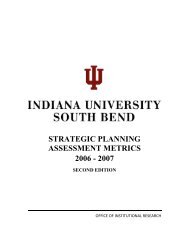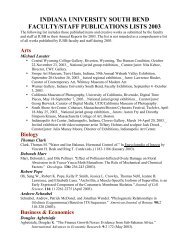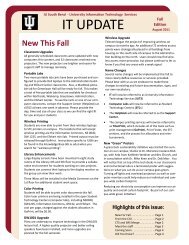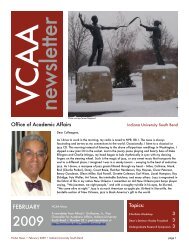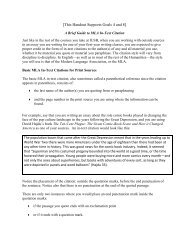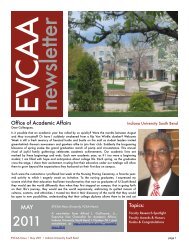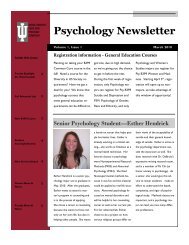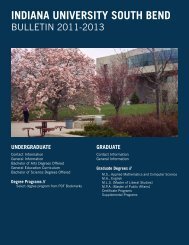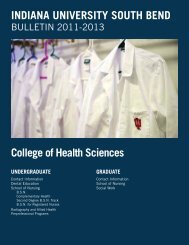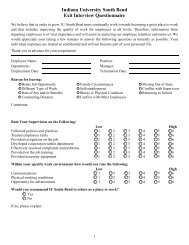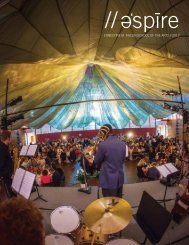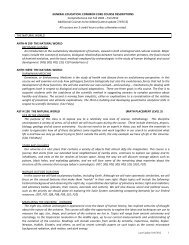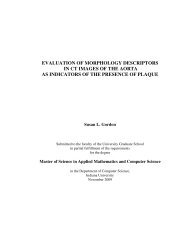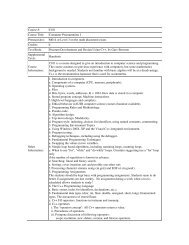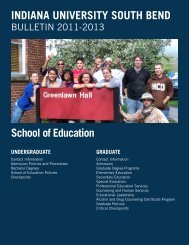Current version - Indiana University South Bend
Current version - Indiana University South Bend
Current version - Indiana University South Bend
Create successful ePaper yourself
Turn your PDF publications into a flip-book with our unique Google optimized e-Paper software.
PURDUE UNIVERSITY COLLEGE OF TECHNOLOGY COURSE DESCRIPTIONS 4419<br />
MET 21100<br />
MET 21300<br />
MET 21400<br />
MET 22000<br />
MET 23000<br />
MET 24500<br />
MET 38200<br />
Applied Strength of Materials (4 cr.)<br />
P: MET 11100, MET 16200, MA 22100 or<br />
MATH-M 119. The principles of strength.<br />
stiffness, and stability are introduced<br />
and applied primarily to mechanical<br />
components. I<br />
Dynamics (3 cr.)<br />
P: MET 11100, MA 22100 or MATH-M<br />
119. Kinematics and kinetics principles<br />
of rigid-body dynamics are introduced.<br />
Emphasis is on the analysis of bodies in<br />
plane motion. I<br />
Machine Elements (3 cr.)<br />
P: MET 21100, MET 21300. The methods<br />
developed in statics, dynamics, and<br />
strength of materials are applied to the<br />
selection of basic machine components.<br />
The fundamental principles required<br />
for the selection of individual elements<br />
that compose a machine are developed.<br />
Selected course topics are included as<br />
computer exercises. II<br />
Heat and Power (3 cr.)<br />
P: MA 22100 or MATH-M 119, MET<br />
16000, PHYS-P 201 or PHYS-P 221.<br />
Heat and Power is an introduction to the<br />
principles of thermodynamics and heat<br />
transfer. Basic thermodynamic processes<br />
are used to evaluate the performance of<br />
energy-based systems such as internal<br />
combustion engines, power plants, and<br />
refrigeration equipment. II<br />
Fluid Power (3 cr.)<br />
P: MET 11100 or PHYS-P 201 or PHYS-P<br />
221; MET 16000, MA 22100 or MATH-M<br />
119. This course consists of the study<br />
of compressible and incompressible<br />
fluid statics and dynamics, as applied to<br />
hydraulic and pneumatic pumps, motors,<br />
transmissions, and controls. II<br />
Manufacturing Systems (3 cr.)<br />
P: MET 14300, MA 15900 or<br />
MATH-M 115. This course surveys the<br />
manufacturing processes and tools<br />
commonly used to convert cast, forged,<br />
molded, and wrought materials into<br />
finished products. It includes the basic<br />
mechanisms of material removal,<br />
measurement, quality control, assembly<br />
processes, safety, process planning, and<br />
automated manufacturing. I<br />
controls and instrument<br />
AUTOMATION (3 cr.)<br />
P: MA 22100 or MATH-M 119. Study<br />
of the procedures and techniques<br />
essential to industrial measurement and<br />
transmission of data is provided in the<br />
areas of microprocessor control, process<br />
control, and automated testing. Concepts<br />
of hysteresis, repeatability, weighted<br />
signals, span, suppression, range, and<br />
closed loop control are emphasized.<br />
MET 45100 manufacturing quality control (3<br />
cr.)<br />
P: STAT 30100 or MATH-K 310 Quality<br />
control practices used in manufacturing<br />
industries; management, statistical<br />
control charts, reliability, sampling plans,<br />
economics, computer methods, and test<br />
equipment are presented and applied.<br />
Credit will not be granted for both MET<br />
45100 and MFET 45100.<br />
mfet: manufacturing engineering<br />
technology<br />
MFET 30000<br />
APPLICATION OF AUTOMATION IN<br />
MANUFACTURING (3 CR.)<br />
P: ECET 21400, MET 24500. Basic<br />
introduction to automation applications<br />
in manufacturing and the impact<br />
of computer-based systems on a<br />
manufacturing company. Coverage<br />
includes practices and the various issues<br />
related to the application of computerintegrated<br />
manufacturing. Emphasis<br />
placed on CAD, CAM, CNC, robotics,<br />
industrial control elements, PLCs, and<br />
computer-based process controls.<br />
OLS: Organizational Leadership and<br />
Supervision<br />
OLS 25200 Human behavior in Organizations (3 cr.)<br />
A survey of the concepts which provide<br />
a foundation for the understanding<br />
of individual and group behavior in<br />
organizations of work, with special<br />
emphasis on typical interpersonal and<br />
leadership relationships. I<br />
OLS 27400 Applied Leadership (3 cr.)<br />
P: OLS 25200, or consent of instructor.<br />
Introduction to, and overview of, the<br />
fundamental concepts of leadership<br />
and supervision. Emphasis is placed on<br />
the supervisor’s major functions and<br />
essential areas of knowledge, his or her<br />
relations with others, and his or her<br />
personal development. II



